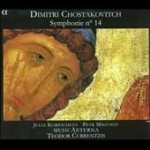This Shostakovich Fourteenth ideally captures the music’s edgy, mournful, and beatific moods. Bass Piotr Migunov sounds appropriately ghostly in De Profundis, and delightfully rude in Réponse des Cosaques Zaporogues au Sultan de Constantinople. Julia Korpacheva captivates with her ethereal, mournful Le Suicidé, and offers sharply etched vocal characterizations in Les Attentives II, even if she does not reach the manic heights of the larger-voiced Galina Vishnevskaya on her classic recording with Rostropovich. In La Loreley both singers wonderfully render the song’s barely controlled hysteria.
MusicAeterna makes up for its small-bodied sound with gripping orchestral execution under Teodor Currentzis’ taut and focused direction. Malagueña leaps about with a singular ferocity, as does Réponse des Cosaques. At the other extreme the players’ sustained intensity enriches À La Santé and O Delvig. (Still, it’s hard to forget Rostropovich’s deluge of strings once you’ve heard it). Alpha’s recording reproduces the performance in vivid, wide-ranging sound. An excellent disc, one of the choice recordings of this uncompromising work. [2/10/2011]
































